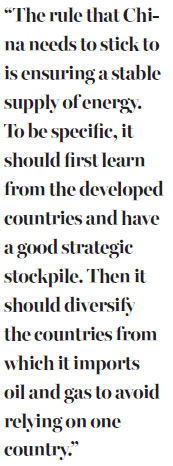As the world faces upheavals, the question of securing oil and gas supplies should be of the utmost importance to China
The global energy landscape is about to be adjusted again. Since the second half of last year, the global oil and gas market has witnessed changes, with the low prices that had lasted for about two years beginning to increase.
At the end of 2016, the Organization of Petroleum Exporting Countries (OPEC) reached an agreement on reducing production after long negotiations. Leading producer Saudi Arabia was very positive about the reduction. Afterwards, non-OPEC countries, such as Russia, also reached an understanding with OPEC and agreed to participate in the reduction. Optimists think the global oil and gas markets have welcomed the opportunity for an increase in oil and gas prices.
However, from the global perspective, the energy landscape might face a new round of adjustments - and also meet with possible shocks.
There are several factors that might cause this. First, the Trump administration's energy policies might be an important source of risks. The new president was strongly against the Obama government's energy strategy that advocated green and low-carbon strategies. He is greatly in favor of reviving the United States' hydrocarbon energy industry and realizing energy independence. The global energy landscape might face the biggest change since World War II. With US oil and gas production and consumption increasing, the Western hemisphere will be a new key point of the global energy production structure.

Second, oil and gas producers in North America who reduced production due to low prices might now restore production. The sharp increase of oil and gas from this region will weaken the effect on the global market of OPEC's cut, so the situation of oversupply will remain.
Third, Trump is in favor of protectionism and his strategy could have a huge impact on the global political, economic and financial orders. The world might see a new round of disorder, such as the conflicts in the Middle East, shocks in the financial markets and upheaval in the global energy market.
The rule for China is that it needs to ensure the stable supply of energy.
Energy has two features: It is a strategic resource, but is also a commodity that can freely flow in the market, so it can be sensitive and fragile.
There is already a well-developed system in the world for the exploitation and use of energy. China's rapid industrialization and urbanization demands increasing supplies of energy. Domestic production cannot meet the needs for social and economic development so the reality is that China depends on global markets to ensure its energy supply.
Based on this premise, we need to know that China's energy security will be affected by the global landscape and market fluctuation and we don't need to be over-concerned about it.
The rule that China needs to stick to is ensuring a stable supply of energy. To be specific, it should first learn from the developed countries and have a good strategic stockpile. Then it should diversify the countries from which it imports oil and gas to avoid relying on one country. Meanwhile, it should make use of the global market's spot transactions and future trading and reduce market risks.
China should also seize opportunities to properly participate in global energy governance.
Although Trump's protectionism talks have caused concern globally, if we look at the World Economic Forum in Davos, strengthening globalization, breaking down barriers to trade and increasing the liberalization of economy are still commonly-held goals in the world.
If Trump really intends to implement the strategy of "American First", the US is likely to reduce its involvement in global governance. In these circumstances, how to make sure the absence of the US does not have fatal influence on global energy governance, and how to innovatively build new systems to reduce risks to the global energy order will become huge problems. China should seize the opportunity to participate more actively in global energy governance and have more say.
It should emphasize that energy-saving and environmentally-friendly development should be the route to follow.
At present, the reality for China is that it has a huge population, and rapid economic development - with the accompanying large energy demands - will create more potential for environmental pollution.
China's reality is that it lacks oil and gas and energy efficiency is quite low. If China relies on more imports to solve the supply problem, but doesn't improve efficiency, the energy security situation will always be tense. It is only when China makes major efforts in energy-saving, environmental protection and reducing consumption that the problem will be solved.
The author is an assistant professor of the Beijing Academy of Social Sciences, and a research fellow of the Pangoal Institution. The views do not necessarily reflect those of China Daily. The views do not necessarily reflect those of China Daily.
